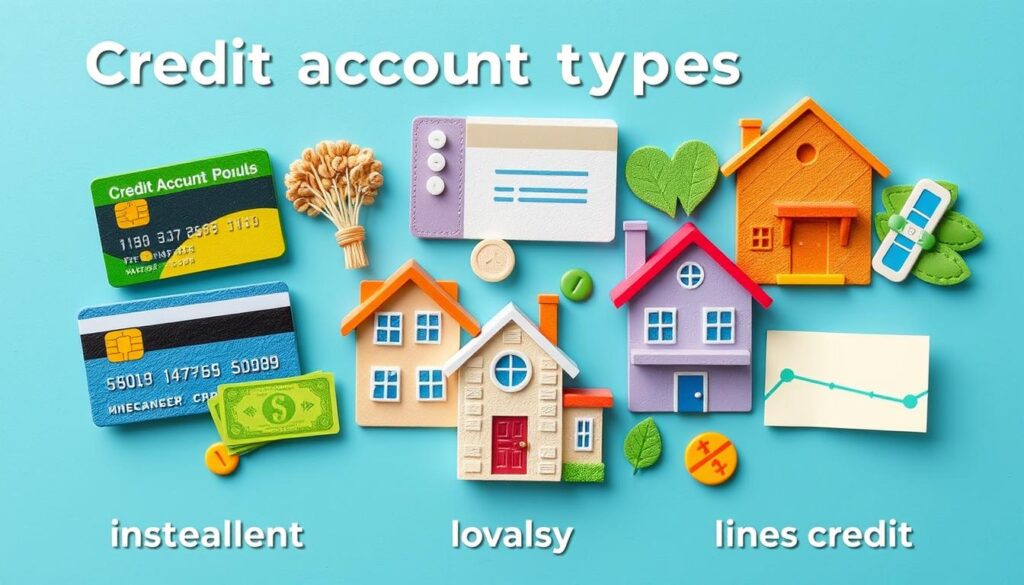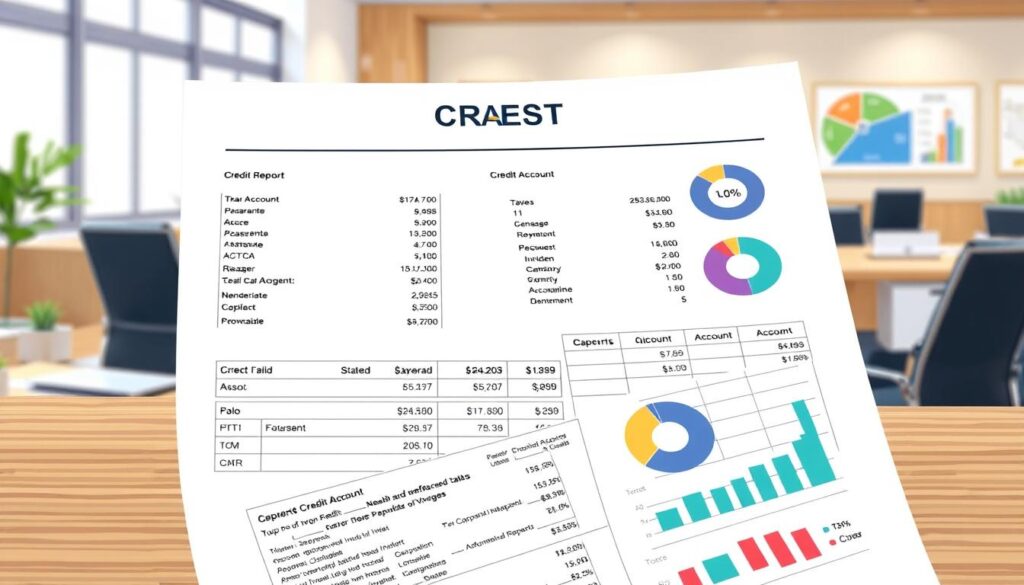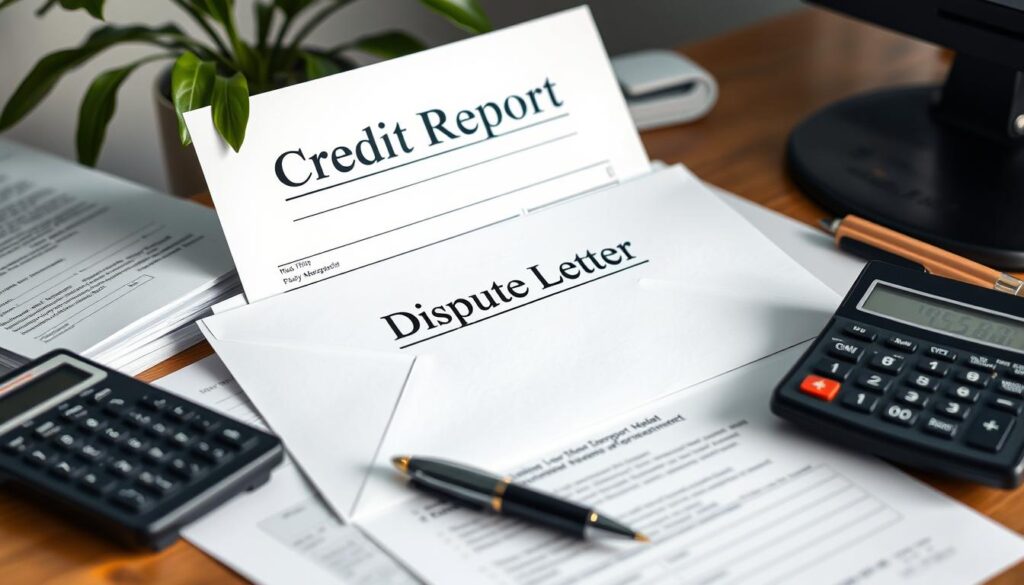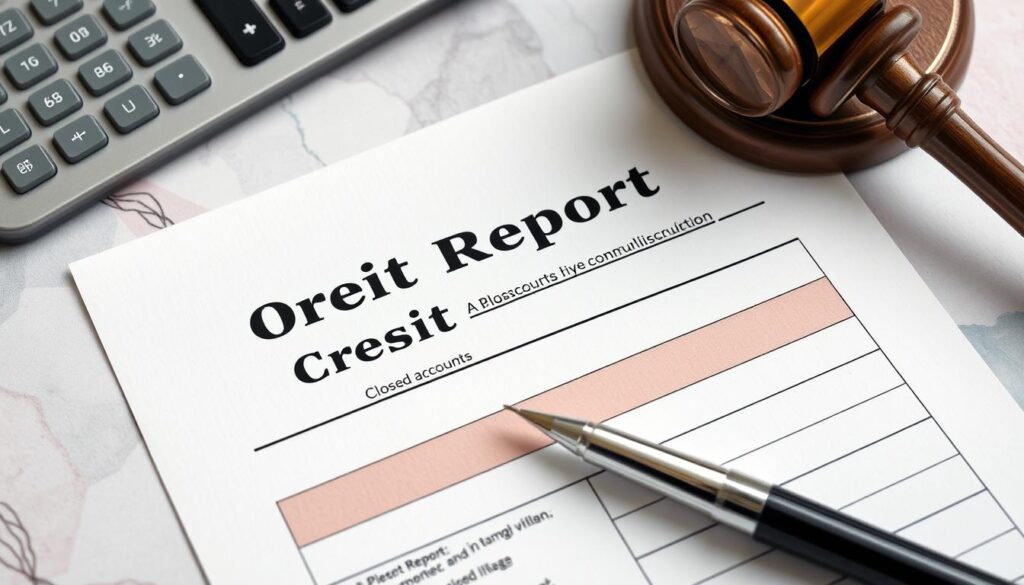A clean credit report is vital for a good credit score. Closed accounts can harm your creditworthiness, even if they’re in good standing. This guide will help you remove closed accounts from your credit report.
We’ll show you how to improve your financial well-being. You’ll learn to identify closed accounts and dispute them with credit bureaus. We’ll also cover strategies for maintaining a clean credit report.
Key Takeaways
- Understand the different types of credit accounts and their impact on your credit report
- Learn why removing closed accounts is important for improving your credit score
- Discover the steps to obtain your credit reports and identify closed accounts
- Understand the process of drafting and submitting disputes to credit bureaus
- Gain strategies for following up on disputes and handling persistent credit report errors
- Learn how to maintain a clean credit report and prevent future issues
- Improve your overall financial well-being by taking control of your credit history
Understanding Credit Report Entries
Your credit report shows your financial activities. It lists your credit accounts and their status. Understanding these entries is key to maintaining good financial health.
Types of Credit Accounts
Your credit report may include several different types of credit accounts, such as:
- Credit cards (both open and closed accounts)
- Installment loans (e.g., auto loans, student loans, personal loans)
- Mortgage loans
- Retail accounts (store credit cards)
These accounts affect your types of credit accounts and credit score. Keep a close eye on them to manage your financial health.
Importance of Accurate Credit History
An accurate credit history is vital for your financial well-being. Lenders, landlords, and employers use your credit report. It helps them judge if you’re trustworthy with money.
Mistakes on your report can cause problems. You might be denied credit or face higher interest rates. It could even affect your housing or job prospects.
Check your credit report often. Fix any errors you find. This helps ensure your financial history is correct. It can improve your chances of getting better credit deals.

Why Remove Closed Accounts?
A clean credit report is vital for your financial health. Removing closed accounts is a key step. This process can significantly impact your credit score and overall financial well-being.
Removing closed accounts can improve your credit utilization ratio. This ratio compares your credit card balances to your credit limits. It’s a crucial factor in determining your credit score.
By removing closed accounts, you can lower your total credit limit. This can help reduce your credit utilization ratio. As a result, your credit score may improve.
Closed accounts can hurt your credit history length. This is another important factor in credit scoring. Removing them can help maintain a longer credit history.
A longer credit history shows responsible financial management over time. This can be beneficial for your overall credit score.
Closed accounts may contain inaccurate information. This could include wrong closure dates or balances. Such errors can negatively affect your credit score.
Removing these accounts ensures the accuracy of your credit report. It helps maintain the integrity of your financial information.
“Maintaining a clean credit report is essential for securing favorable financing terms, renting an apartment, or even getting hired for certain jobs. Removing closed accounts is a crucial step in this process.”
Removing closed accounts can improve your credit utilization ratio and preserve credit history length. It also helps correct inaccuracies. Taking this step can lead to a stronger financial future.
Preparing to Dispute Closed Accounts
Start by getting credit reports from Experian, Equifax, and TransUnion. This is key for spotting closed accounts and preparing to dispute errors. These reports help you find issues in your credit history.
Obtaining Credit Reports
Get free yearly credit reports from AnnualCreditReport.com. This site offers a safe way to get reports from all three bureaus. Check each report carefully, as they may show different info.
Identifying Closed Accounts
Look for accounts marked “closed” or “inactive” in your credit reports. These are the ones to focus on when disputing errors. Note the creditor’s name, account number, and closing date for each account.

“Regularly reviewing your credit reports is essential for maintaining a healthy credit profile and identifying any potential issues, such as closed accounts that need to be disputed.”
Getting your credit reports and finding closed accounts is crucial. This process helps you prepare a strong dispute. It also keeps your credit info accurate and up-to-date.
How to Remove Closed Accounts from Credit Report
Removing closed accounts from your credit report can boost your credit score. This process involves disputing unwanted entries to improve your credit history. Let’s explore the key steps to achieve this goal.
Drafting a Dispute Letter
Start by writing a clear credit report dispute letter. List the closed accounts you want removed and explain why. Include account numbers and closure dates for each entry.
Keep your tone professional and polite in the letter. Stick to presenting facts without making accusations. This approach increases your chances of success.
Gathering Supporting Documentation
Collect evidence to back up your dispute. This may include account statements, payment receipts, and proof of account closure. Organize these documents clearly to help credit bureaus process your claim quickly.
A well-prepared evidence package strengthens your case. It shows you’re serious about correcting your credit report.
| Documentation Checklist |
|---|
|
Following these steps can help you remove closed accounts from your credit report. With a strong dispute letter and solid evidence, you’ll improve your financial standing.

Submitting Disputes to Credit Bureaus
Removing closed accounts from your credit report starts with proper dispute submission. This process needs careful attention and a step-by-step approach. It ensures your concerns are addressed quickly and efficiently.
Follow these key steps when disputing credit report information:
- Get your latest credit reports from Equifax, Experian, and TransUnion. Find closed accounts for removal and collect supporting documents.
- Write a detailed dispute letter for each bureau. Clearly explain the errors or inaccuracies you’ve found on your credit report.
- Collect extra proof, like account closure statements or creditor correspondence. These will support your claims.
- Send your disputes to the credit bureaus by mail or online. Follow each bureau’s specific procedures.
- Keep track of your disputes’ status. Be ready to follow up if needed. Bureaus must respond within a set timeframe.
A careful approach to how to submit credit report disputes boosts your chances of success. It helps with disputing credit report information with bureaus and removing closed accounts.

“Maintaining a clean credit report is crucial for securing favorable financing options and achieving your financial goals.”
Following Up on Disputes
Removing closed accounts from your credit report requires careful follow-up. After submitting disputes, it’s crucial to check their status. Review responses from credit bureaus to ensure the process is on track.
Reviewing Credit Bureau Responses
Credit bureaus must investigate disputed items and provide a written response. Review these responses carefully to confirm closed accounts are removed or updated. Check any details or explanations about their findings.
If changes aren’t made, don’t lose hope. You can escalate the dispute and provide more evidence. This helps support your case for removing closed accounts.
Monitoring Credit Report Changes
- Regularly check your credit reports from all three major bureaus – Equifax, Experian, and TransUnion – to ensure the closed accounts have been successfully removed.
- Set up credit monitoring or alerts to stay informed of any changes to your credit report, including the status of your disputes.
- Be patient, as the credit bureaus have 30-45 days to investigate and respond to your disputes.
Stay vigilant in tracking your credit report disputes. This ensures closed accounts are properly removed from your credit history. Your efforts can lead to an improved credit score and better financial health.
Handling Persistent Errors
Credit report errors can be stubborn. Don’t lose hope if your disputes aren’t resolved right away. There are more ways to tackle these issues.
Escalating Disputes
When credit bureaus fail to fix errors, it’s time to step up. Send follow-up letters with new proof. Clearly state your dissatisfaction with their previous response.
You can also reach out to the creditor directly. Ask them to update the information they report to the bureaus.
If bureaus still don’t respond, take further action. File a complaint with the Consumer Financial Protection Bureau (CFPB). Your state’s consumer protection agency is another option.
| Additional Steps to Remove Closed Accounts | Advantages |
|---|---|
| Send follow-up dispute letters | Demonstrates persistence and reinforces your case |
| Contact creditors directly | Prompts the creditor to update information with the bureaus |
| File complaints with CFPB or state agencies | Triggers investigations and pressure on credit bureaus to resolve issues |
Dealing with credit report errors can be tough. But with the right approach, you can remove closed accounts. Keep good records and don’t give up.
Maintaining a Clean Credit Report
A clean credit report is vital for your financial health. It helps you get better loan terms and prevents future errors. Here are some key tips to keep your credit report spotless:
- Ongoing Credit Report Monitoring: Check your credit reports from Equifax, Experian, and TransUnion regularly. Look for inaccuracies or suspicious activity. Review your reports yearly or use a monitoring service.
- Prompt Dispute Resolution: Find errors? Act fast to dispute them with the right credit bureau. Provide clear proof and follow the dispute process carefully.
- Responsible Credit Behavior: Keep a good credit mix and pay on time. Maintain low credit use. These habits will maintain a clean credit report and show lenders you’re trustworthy.
Use these strategies to prevent future credit report errors. They’ll help keep your credit history positive. Regular credit report monitoring and quick action against mistakes are key.
These steps will help you maintain an excellent credit profile. This can lead to better financial opportunities in the future.
“A clean credit report is the foundation of financial success. Protect it diligently, and it will serve you well.”
Conclusion
We’ve explored how to remove closed accounts from your credit report. This process can boost your financial health. An accurate credit history is vital for your financial well-being.
Key steps include reviewing credit reports and identifying closed accounts. Follow the dispute process with credit bureaus. Address any unresolved issues persistently.
A clean credit report is crucial for good loan terms. It also opens doors to better financial opportunities. These factors help you achieve long-term financial goals.
Monitor your credit reports regularly. Stay alert for changes or errors. Be ready to dispute inaccuracies promptly.
Keeping your credit profile pristine can boost your credit score. It also provides financial flexibility and peace of mind. Take action today to remove closed accounts.

